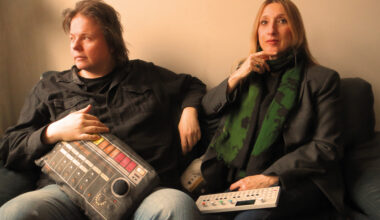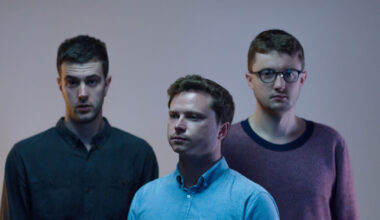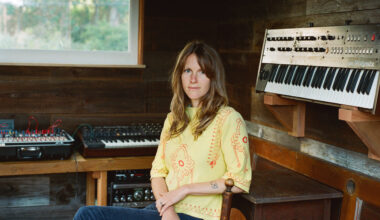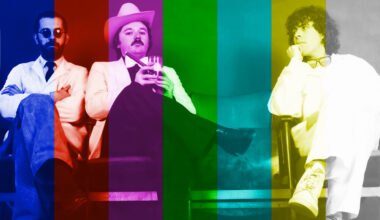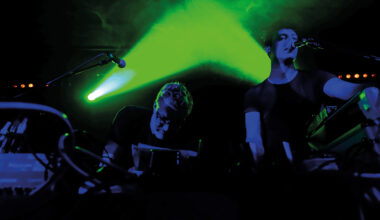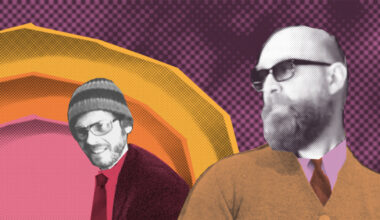if ovations are the barometer, The highlight of Berlin’s Pop-Kultur festival 2017 was Düsseldorf’s prepared piano duo Grandbrothers. Following their rapturously received show, we caught up with them backstage…
Faust’s Jochen Irmler once told me that his search for “exactly the right sound”, tones he’d been imagining in his head since childhood, but he’d yet to hear for real, only came to an end once he’d built his first proto synth/organ back in the late 1960s. It’s easy to imagine that the Düsseldorf pairing and university music faculty pals Erol Sarp (piano) and Lukas Vogel (electronics) have been on a similar journey. For they, as prepared piano outfit Grandbrothers, do something very interesting with the grand old Joanna.
While this whole prepared piano business might well have started back in the 1940s with John Cage, and his Henry Cowell and Schoenberg-influenced innovations, Sarp and Vogel interpret the template very differently. Their compositional approach is uniquely democratic; emotionally rich, cinematic, rhythmically complex and free of anything that drifts too close to the avant-garde. Instead it’s suffused with the influence of Roedelius-like ambience, cyclical patterns reminiscent of Steve Reich, and even Philadelphia house music.
Sarp’s treated piano strings are morphed and manipulated endlessly by Vogel’s clever electronic interventions, which – especially as a live experience – expand the grand piano’s musical potential exponentially.
The elaborate mechanics that transform its sound are all down to Vogel’s innate skills as an engineer and software designer. His homemade apparatus physically affects both the piano’s strings and body. Sarp’s notes are then live-sampled and fed into a specially adapted computer.
We’re backstage with the pair after their astonishing show at Pop-Kultur festival in the old East Berlin district of Prenzlauer Berg. The event is being held at a wonderful arts hub called the Kulturbrauerei – a cathedral-like, redbrick industrial wonder; part-factory, part Teutonic fantasy castle, and once the world’s largest brewery.
Looking drained, but clearly elated after delivering the goods to a palpably expectant audience, Grandbrothers are an affable, softly spoken pair of early 30-somethings who seem rather surprised at all this new-found attention.
“We’re just working on this project. It’s something we started at university and we are still exploring it, so it’s nice that other people enjoy it too,” says Vogel, with a general self-effacement that they both appear to share.
“We were both always connected to the piano and had lessons from an early age. At university back in 2007, we agreed that we’d both take on this project,” offers Sarp.
They received encouragement from one of their tutors to find new ways of expression.
“We weren’t sure where to go or even what to do at first,” says Sarp, “but we knew we had to find sounds that were different. We began knocking on the wood and tweaking the strings, in a way that people like Hauschka, and back in the beginning, John Cage had already been doing.
“But then, after time, these little ideas came out and we started thinking about how we could still ‘play’ the piano without necessarily sitting in front of it. So instead we looked at feeding notes through the computer, letting sounds generate themselves. And that’s really where we began this journey of experimentation and exploration that now seems as though it will be continuous.”
The first show they gave at university was a great success, giving them the courage to continue with their investigations instead of taking a more conventional approach.
“But truly,” insists Sarp, “we had no ambitions to be commercially successful.”
“We were given complete freedom at college,” remembers Vogel. “We could access the grand pianos anytime, and were always encouraged to take our time, and take risks. We could even buy new equipment, as long as we could argue our case.”
The first breakthrough they made was with live sampling techniques, and layering effects of programmed loops and delay.
“It really surprised us how great this relatively simple treatment sounded,” says Vogel. “This development gave rise to the idea of not using any electronic instruments. All the sounds we made had to emanate directly from the piano.”
“Yes!” exclaims Sarp, chipping in with his own memory of their early epiphany. “These restrictions meant that we had to find our own solutions to these challenges, instead of taking the easy options like introducing a drum machine.”

Which brings us neatly to the beats. They wanted to include rhythmic elements not ordinarily associated with the piano. And so, determined not to use any kind of percussive instruments, they landed on the bright idea of directly beating the piano’s strings.
“We didn’t want to use bass or snare drums,” says Sarp, “but discovered we could make a beat that sounds very much like a hi-hat by reaching inside and physically engaging with this very large instrument.”
And so the treatments and preparations all developed from there with bespoke, hand-soldered string hammers, metal bows and complex wiring that looks not unlike giant squid-ink spaghetti.
“Some of the main mechanical elements remain constant,” says Vogel. “But now we can use more powerful effects like distortion and bitcrushing, so the sound becomes denser. Maybe the biggest recent change is the introduction of the bows. They oscillate the strings without touching them by using an electromagnetic field.”
All of this is writ large on new album, ‘Open’ and, as if to validate their mission to create this multiplicity of sound and pattern, it is all laid out before our very eyes in the Kesselhaus concert hall, once the boiler room of this vast brewhouse.
The performance was singled out for special Commissioned Work status at Pop-Kultur by festival director Christian Morin, who, along with his colleague Martin Hossbach, has driven the curation of the event since its inception two years ago.
He earmarked Grandbrothers after putting on a show with them at the city’s Volksbühne (People’s Theatre) venue last year, following the release of their much-lauded 2015 debut long-player, ‘Dilation’. The Volksbühne show sold out, and it was there that Morin saw the potential for a Grandbrothers appearance to become, in his words, “more than just a performance”.
Morin’s background in theatre and drama is one of the driving factors behind Pop-Kultur’s success and its growing reputation.
“Our aim was always to get away from the music festival ‘norm’ and incorporate more of the artist’s vision into performances here,” says Morin, an amiable, native Berliner. “When you work closely with artists of any discipline you realise there are so many ideas out there that are separate from their day-to-day obligations. Often it’s a question of time, inclination or just experience, in order for them to bring these ideas to reality.”
Which is where the commissioned work comes in. Each year the festival, supported by funding from both the capital and the EU, targets a select number of artists and provides an additional production budget that allows them to focus more specifically on maximising the performance aspect. The hope is then that the show will become as much about, as Morin puts it, “the art and the artist”, thus creating something of a one-off spectacle for the festival.
For their commissioned piece, ‘White Nights – A Theatre Of Light’, Grandbrothers have been paired with Berlin’s renowned audio-visual design agency Bureau Mario Lombardo to stunning effect.
The performance opens with real drama. Lombardo’s use of blinding white light, dark shadows, tunnels of mist and extraordinary dry ice pyramids turns the show into a transportative, captivating experience.
Sarp’s grand piano strings, heavily treated after a long day of preparation, are initially plucked, beaten and hammered directly . It’s hardly a work of gentle neo-classical exploration, which some here seem to be anticipating. But just as expectations are readjusted, the show becomes something else. Sarp gently caresses the ivories, playing with studied delicacy and delighting us with strings that sound dulcimer-like, while Vogel counters with basso profundo digital thrums. You barely see that coming.
The same goes for the hands-in-the-air house moment we are unexpectedly plunged into minutes later. Keyboards build and build and are looped and arpeggiated, filling the space with tangible euphoria.
In between numbers they offer a charming line in disarming humility, which only adds to the warmth and intimacy of their set. The audience, appreciative of the spectacle they’ve just witnessed, show their appreciation at the close with the lengthiest ovation of the whole festival. And rightly so.
‘Open’ is out on City Slang

